Do you ever let your mind wander to a place just out of reach? Have you seen the fossils of extinct creatures in museums and wondered what they were really like? Have you been teased by thoughts of what our human ancestors might have seen when they first came to South America—creatures now gone from memory, represented only by the hardiest fossil record? Many have fallen into extinction but some remain. In great tracts of primeval forest, still chiefly untouched by human hands, life teems in myriad varieties, millions of nooks and crannies filled with specialised life forms, known and unknown, awaiting our curious glance. I could only begin to wonder how many weird creatures—with whom we share their fragile planet—I’d get to intimately glance. I wanted to see them all! An unattainably romantic ambition but heading into the Amazon, I was going to give it a damn good try.
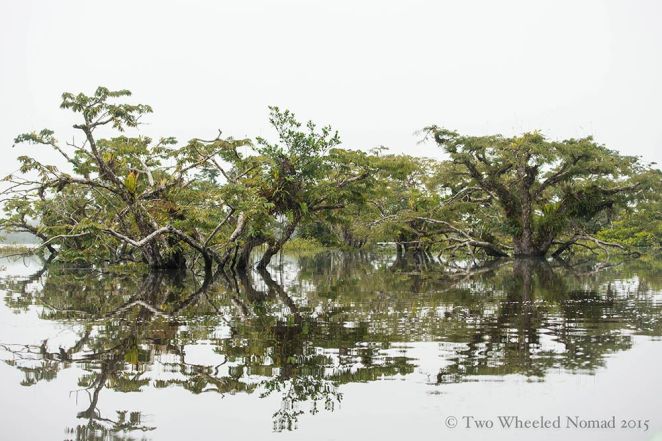
An earthy dirt track led us out of Peru onto an eventual paved-ish road, squeezing past umpteen more soggy mud-stricken and rock-riddled landslides along the way. Taking a part of Peru with me was easy; dirt was ingrained on my skin speckling me with a face full of au naturel ‘beauty’ spots. A long border crossing at La Balsa and an increasingly sore day in the saddle contoured us around the rough green fabric of the mountains, with a town gently coming into focus on its hem.
Arrr, the Ecuadorian utopia that was Vilcabamba; a rural idyll after spending all morning up to our maracas in mud—sloshing through Ecuador’s quaggy roads under construction, around every cruddy corner. Oh my Yin-Yang, where were we? No more rough-shack villeras—shanty towns scurrying up the mountainside. Or an ebb and flow of people selling ropey food and liquid sugar in their faded sombrero shaded, plastic table and chaired open-air cafes. Goodbye cholesterol palace of heated display cabinets containing twice and thrice deep-fried everything, hello actual sustenance. Even the searing heat had mostly gone, tamed by the elevation.
Instead, we were greeted by a crisply painted plaza bedecked with colonial buildings—some in an elegant state of decline, while others had been spruced up into bohemian bars and bustling little eateries, rurally decorated. The odd tienda neatly displayed its handicrafts, organic super-food produce and local wares. Through the gaps between the mountains, in the patches of blue sky, wisps of clouds painted graceful swirls. The sun was in free fall towards the town, glinting off the swept streets and anointing the place with a golden glow. The gleam of cut lime green grass added further to this pristine clean enclave. Feeling a year’s worth of muck and grime in my tramp-blackened body and motorcycle gear—the latter of which hadn’t seen soap for over a year—I took my thousand-wear-grey riding suit straight to the launderette and me to get washed.
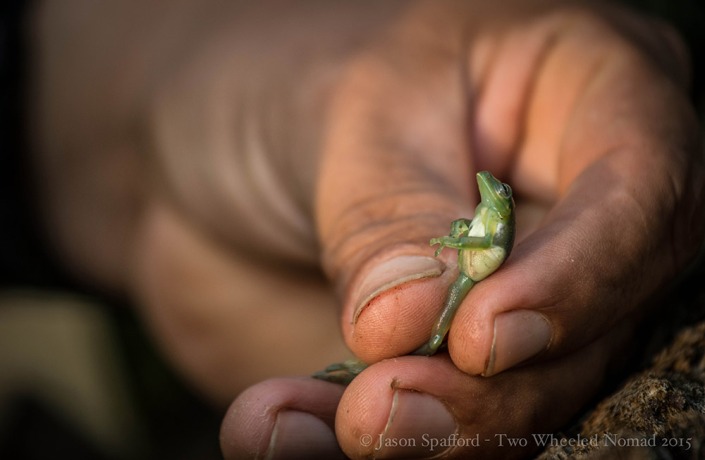
Tantalising on all the senses—all three and a half of mine anyway from having a zero sense of smell and a weak sense of taste—Vilcabamba boasted a deep sense of good healthy living amongst a bubbly boho community. I overheard one woman walking her dog on a string remark to her friend, “Ooh I just ad-ore talking about bowel movements, it’s fascinating. Seriously, I could talk shit all day.” Appreciating that they should fly out like a neat loaf perhaps more than most, I was hooked and hadn’t even kicked the side-stand down. The view out was one of peaceful treetops, and the soundtrack played the uplifting twitter of tropical birds. Even our Hostal Taranza didn’t cost us several arms and legs, although you’ll be falling over places that will if you do visit.
Upon a disinclined departure, I couldn’t help thinking we’d chanced upon a standalone sparkling gem of a place, contrary to so many garbage-infested places prevalent in Peru. But no—after the sudden shockwave of Vilcabamba receding in our mirrors—for the next few hours, I clocked a handful of cheery lads hanging off the back of a waste disposal truck, big bottle banks in the proceeding towns, bold road signs alerting folks to ‘Keep Ecuador clean’ and a complete lack of trash. How can one country get it so wrong and an adjoining one so right? Oh, and fuel set us back 25 pence per litre, equivalent to $1.40 USD for a gallon. Ecuador was definitely going to agree with us both.
Having donned the LBNs (little black numbers) for the rainy season’s drizzly ride ahead, a second shock horror ensued: this time Jason’s rear suspension decided to expire like a campfire at dawn. He pogo-sticked his way for 235 miles from Vilcabamba to Alausi on his two-wheeled bouncy castle. If it’s not one thing, it’s your BMW shock—clearly not designed to cope with long term adventure riding. My vantage from behind though was comedy gold; a bobbing-to-some-hip-hop-beat-Cadillac on two tyres instead of four. Shouldn’t joke, no it wasn’t funny. Just the ups and downs of motorcycle travel…stop it, Lisa.
Through a straightforward road system of remarkably calm and considerate traffic, my die-hard survival instincts kicked in all the same; expecting the worst upon entering Quito. As a tendril of anxiety took leave from my soul, I had to entirely reprogramme the ‘inner-anarchist’ part of my brain. Eerily quiet in the Sunday silence—courteous buses(!), truck drivers and 4x4s were all giving way to me—pre-empting a change in their direction with indicators(!), and all without honking the horn. Not even once. It was steady; unspectacular; fine. My Zen was rapidly restored in turn equilibrating a mental inner balance. And I could have sworn my body all but exploded into beams of sunlight.
Bikes safely stowed in Hostel Zentrum courtesy of its two attentive German owners, we packed only the essentials: rum and repellant, a fresh razor (I’ve been mistaken for a redheaded primate before) and our remaining store of English teabags. The overnight bus—from Quito to Lago Agrio—was a rampaging old boar of a vehicle with an imposing snout and grille. It looked like it should be foraging wildly in the Amazon’s undergrowth rather than roaming the streets. The vehicle snarled into life, reversed out of its berth and our journey began. Our short-range rural beast and then an old banger of a minibus took us to the start of our jolly in the jungle at the Cuyabeno River.
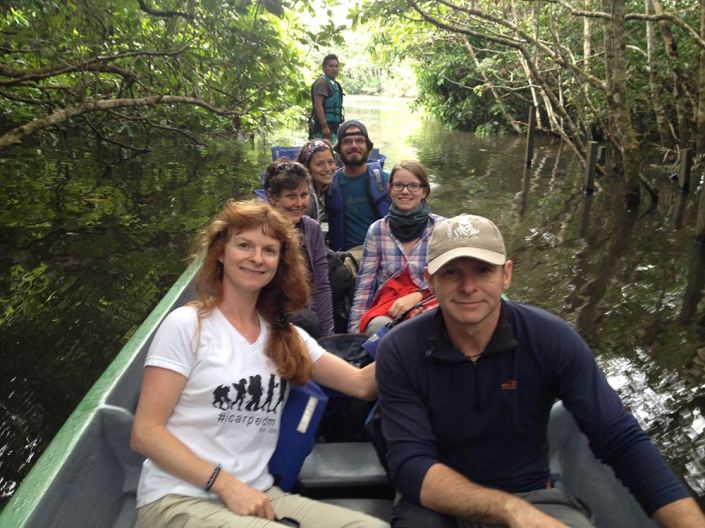
“WELCOME TO THE JUNGLE!”, blared through my head, courtesy of Guns and Roses the moment we stepped into our motorised canoe. Down in the river bottom, the barest hint of green whiskered the banks of the Cuyabeno. At only six metres deep, it looked more like an abyss of beef stock gravy made dark and glossy by the nutrients infused by the soil and tannins released from the decomposing leaves. Every drop was from rainwater, which fascinated me; it dries up completely come the dry season in parts, forcing certain lodges to fall into abeyance.
As intrepid if not clueless voyeurs, we canoed our way down an Ecuadorian affluent of the Amazon Basin. Following the tropical vegetation for three hours down river familiarised us to the powerful clay-coloured current of the Basin’s mighty headwater. It’s a place, if there ever was one, where everything is always more than you could ever expect it to be.
The warm breeze whipped at my clothes and ruffled my hair; I looked up and there was a snake bird. Not because it seizes snakes, but because of its long slender neck. Oh my goodness, “Look over there!”. It was a squirrel monkey with a white painted face—nimbly hanging from a ceiba tree. The show turned into a circus of monkeys clowning around—swinging acrobatically from tail to branch, just for the fun of it. Just because they can. It didn’t take long to realise the opportunity cost of looking at one creature to the forfeit of missing another. I needed more eyes, and quick.
The squirrel monkeys often follow the capuchins, another primate perhaps a shade more skilled at seeking out provisions than they are. With a keen sense of where to go to stave off hunger, the capuchin monkeys don’t seem to mind at all they have a scrounging set of followers. Good for them, it’s not always a ‘Dog eat dog’ world.
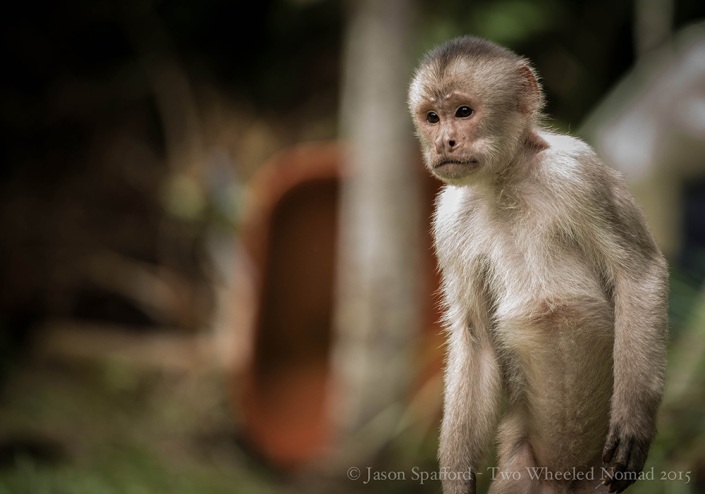
Furiously pushing food into their faces while eyeing us up, these squirrel monkeys took—oh, what was that? Something akin to your Nana’s bulbous shopping bag, or your Grandad’s old sock—suspended from the end of a tree branch. Strategically high up but still hidden from terrestrial (ground-dwelling), arboreal (tree-dwelling) and aerial predators—for the most part. A filigree weaver bird’s nest, wow.
Fluttering by—diverting my attention yet again goes a Morpho butterfly, shimmering its iridescent cobalt blue wings—as big as a pair of man’s hands. Supersized was going to be the common denominator here, my fourth and a half Spidy sense could feel it. Paul, our Quito-based tour operator of Carpe DM located just inside Secret Garden Hostel had exclaimed on top, “If you don’t like your experience with naturalist Luis Torres I’ve assigned to you, I will personally refund every cent.” Money-mouthed convictions that strong coupled with scores of raving Trip Advisor reviews of this Luis, and having spent 6 minutes in the jungle, I had an incline we were onto a win-win.
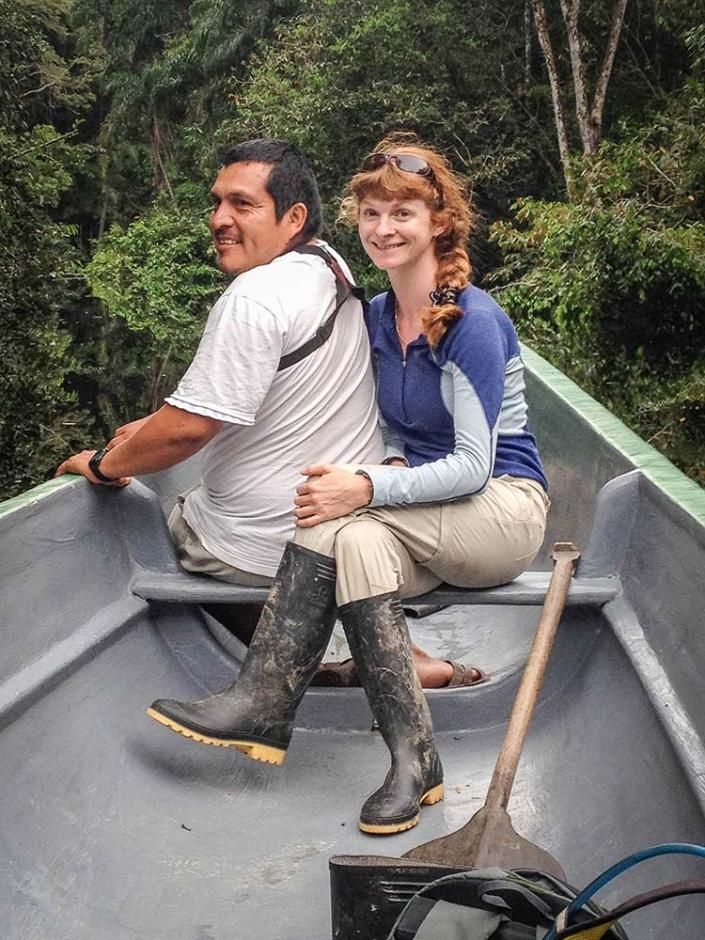
Dumping our bags was the sum total of ‘Getting settled into jungle life’. Done. Siona Lodge was a handmade thatched-roofed snuggery. Adorned with rustic detailing, it struck the perfect cord of traditional: bamboo furniture and locally weaved hammocks, a learning station for all the species awaiting us in the thick of the Amazon and fully enclosed mosquito nets enmeshing our four poster bed from any overly curious creatures. In a wooden cabin on stilts—in the event of flooding—the white fluffy towels and en suite added that little bit of luxury on top.

Dawn spilled through a labyrinth of trees: ferns, ancient kapoks, palms and strangler figs endemic from Cuyabeno were the ones I’d started to recognise. I awoke wide-eyed at a golden veil of light that fell over me and washed by the drowning noises of the forest—crickets, monkeys and birdsong. The dew silvered the spiders’ webs that draped the lodge’s wild garden. I sucked in a deep breath of the damp, moist air. We’re talking 99.9 per cent humidity, so quite humid.
Wafting away a pair of carefree wasps with stingers the size of nails, our first canoe outing ventured us into the heart of the Cuyabeno River, sandwiched by jungle dripping with creepers. A damp mist still hung in the air reducing peripheral visibility and softening the edges of everything making the place look like an indistinct fragment of memory. At a stone’s throw, we spotted a pair of blue and yellow macaws and a rookery of the gregarious Greater Anis. More affectionately known as ‘the cook’ birds who make the sound of gurgling water on the boil. The Hoatzin ‘Stink bird’ is also ten a penny in the Amazon; their meat is renowned to be repulsive but their eggs scrumptious.
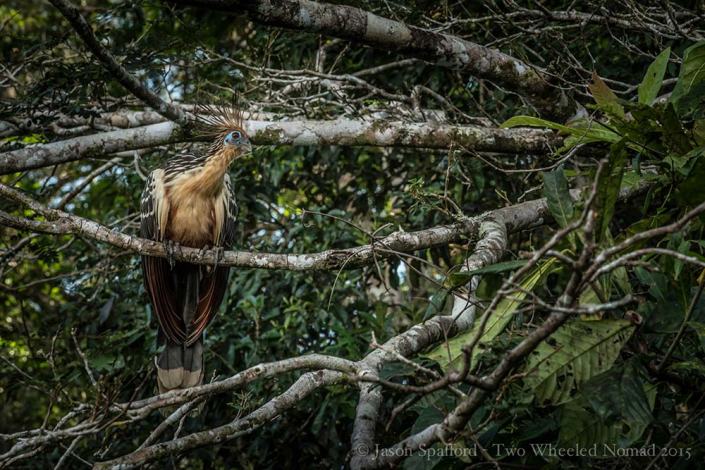
Our night walk took us—and by us I mean me more than Jason—to an intense level. Even though my enthusiasm dial was turned to high and I was assuredly in the mood, my ability to relax in a state of mindful awareness was stymied by some unfounded anxiety. Mayhaps because it was my first night in the jungle, my image tank was getting full and I felt a little overwhelmed by it all. We donned the jungle-strength, tan-removing deet and armed with cameras and rubber boots, ventured out in pitch blackness on foot into the forest. An eerie prickle fluttered up my back—knowing all too well poisonous creatures, paralyzing creepy crawlies with neurotoxins squirting out from giving a misconstrued, furtive glance —come alive at night to play. And hunt. And mess with your melon.
Man, I needed to grow a backbone at that moment. A small thread of panic stitched my chest, I was on edge albeit tingling with raised-hair-on-the-nape-of-my-neck excitement. I soon succumbed to a series of less-than-ladylike flavoured gasps with each brush of hanging vines and plants sweeping around my head, neck and shoulders. Every other tree root seemed to writhe and slither in the shadows cast from erratic beams of torchlight—appearing moistened and snake-like underfoot. To the chorus of the bull frog and rhythm of the cane toad’s ‘ribbet’, we stepped deeper into the black wilderness, a sea of tiny eyes glistening back in the illumination of our headtorches. So far, so nuts.

Arachnidphobics would not last a minute here. Into battle I went, pressing on amidst a constant veneer of adrenaline-induced moisture on the skin. I found myself wiping my hands on my trousers, a reflex when the jungle is sweeping over your shoulders every second with goodness knows what crawling down your back. Every few feet and we were side-stepping around big, furry bird eating spiders, sociable tarantulas, aquatic walk-on-water wolf spiders and tailless whip scorpions whose name pleases me no end. I loved the golden silk orb weavers whose webs were so strong, had you fallen from a height on one, you would probably just sproing right back up and land softly into its deadly trap. Their spun silks are actually used for fishing line and police apparel up in Columbia. Who knew?

The spiders, as venomous as they can get, like the unassuming banana spider—capable of taking a grown man down in minutes—were placid, happy to keep themselves to themselves, industriously working on catching their next meal. It was only when Luis started skillfully grabbing snakes that made my heart start to jump around my chest like a flea on a hot rock. Flying insects darted through the evening dusk in hot pursuit, buzzing in glittering dances around us. They landed on my clammy face, attracted by the beam of my lumens until I was on the brink of madness. Just turn it off! Better, so much better. But then I couldn’t see where the bullet ants were headed—they’ll give you a nasty nip. Equivalent to being shot by all firsthand accounts…whoa! Go figure with a name like that.
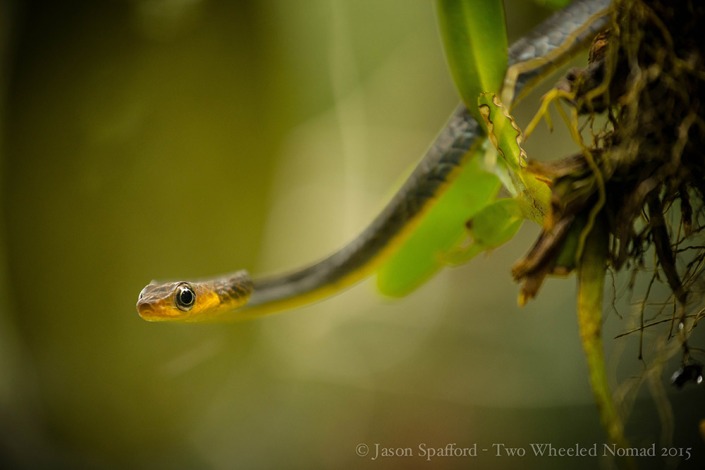
I burst out from the foliage and into the open. The understory of our night walk ended on finding a rainbow boa constrictor taking comfort beneath someone’s cabin, which was elbow-jostlingly popular. Luis debriefed us as we poured over the species safely behind laminated plastic we’d seen that day. He’s the kind of guy that thrives from his cultural heritage and biodiverse back doorstep. I was buzzing off his buzz, like an emphatic bee. The guy dropped all pretense and unexpectedly launched into a great roaring chuckle every now and again. Certainly when I happened to explain what trumping meant. I love it when someone’s laugh is funnier than the joke.
I closed my eyes for a few minutes, barely swinging in a hammock and allowing the last effects of dusk to disappear for the night. Digesting and processing my first encounter with the forest. When I opened my eyes, the night sky was so powerful that I all but experienced vertigo. It felt like I was falling up into space, the stars racing toward me as if to embrace me. I lay down to gaze in wonder at the Milky Way, stunning and intense when undiminished by the pollution of city lights. It was a vastness calling to be gazed up into, making me feel small but comfortable with myself.
Lifting my hands imagining that I could reach out and pluck diamonds, one by one, off a velvet black sky. Shooting stars would occasionally blaze a brief trail across the night blackness. I lay as quietly as I could, allowing the immensity of space and scattered light to dwarf me. Stillness fell like a silk shawl as I lost myself to the starry night. The night’s quiet asserted itself once more.
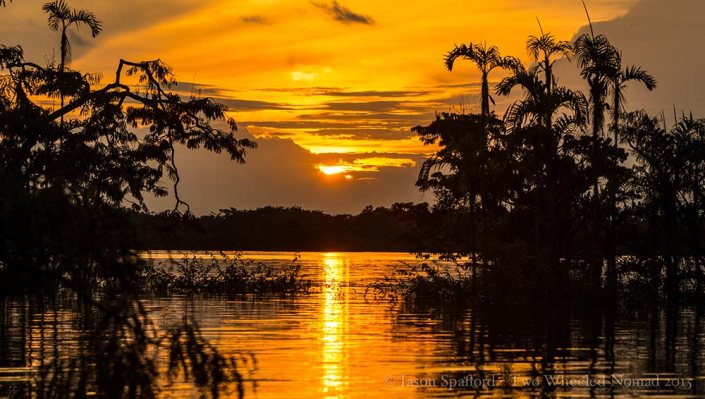

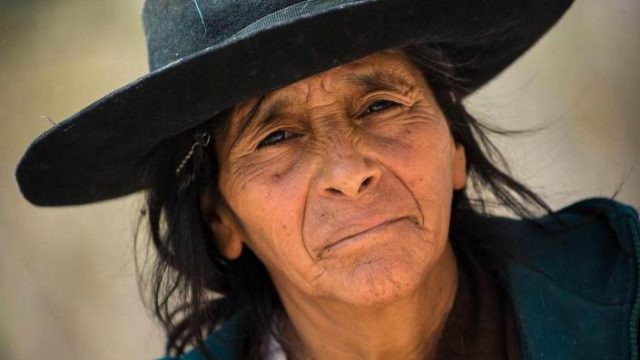
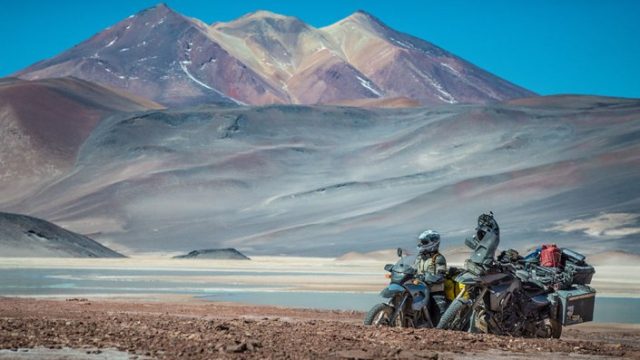
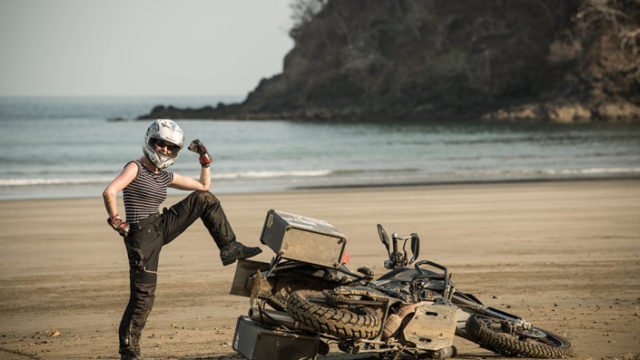
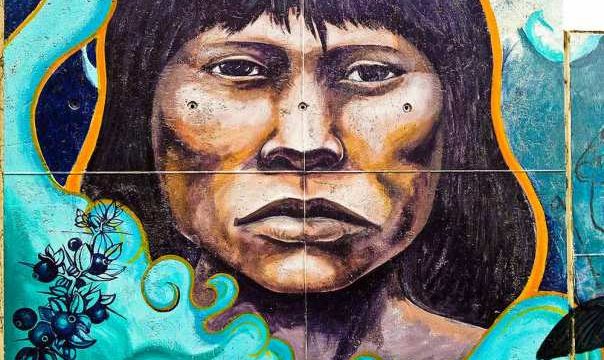
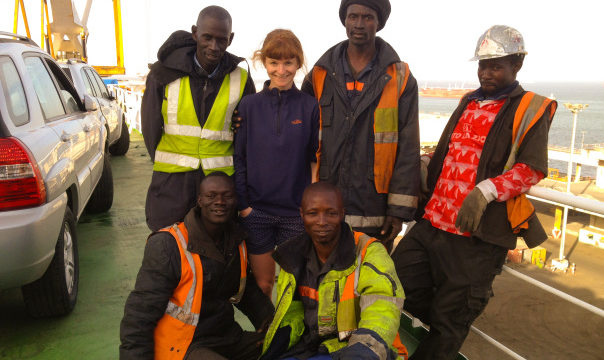
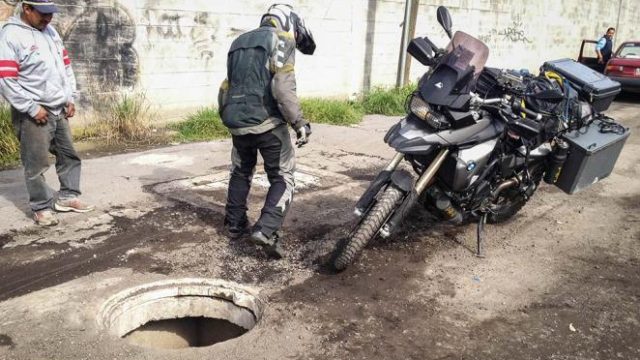
Asking questions are truly good thing if you are not understanding anything entirely, however this article provides pleasant understanding even.|
I enjoy reading through a post that can make men and women think. Also, thanks for allowing for me to comment!